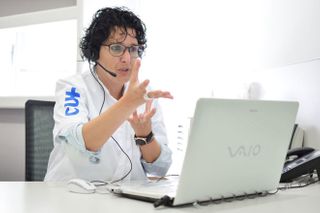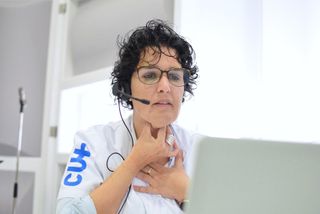- Online speech therapy avoids interrupting the treatment of quarantined patients
- Hybrid speech therapy, involving face-to-face and other online sessions, will become an established alternative in the medium term
The new circumstances created by the pandemic have led to changes in many of the University's activities, taking processes in both teaching and in other fields online. In some cases, these changes are here to stay, such as the online Speech Therapy service, which the University Clinic has incorporated based on its experience during the lockdown period and the early post-lockdown weeks.
The Speech Therapy service of the University Clinic at the Manresa campus was treating 250 people a week at its facilities when it had to close on 13 March due to the health emergency lockdown. The speech therapists and their patients with various disorders (in their speech, swallowing or language, among others) requiring urgent and continuous treatment were placed under lockdown at home due to Covid-19. These people have suffered from a stroke, have a neurological impairment, have undergone oncological procedures, or are children with problems with speech and language or with their orofacial motor skills, among other issues.
The speech therapists began following up these people from their homes. They did this first over the telephone or by email, sending them videos and documents with tips and guidelines. Teresa Solé, the director of the University Clinic, explains that “it was a question of mitigating the impact until we could overcome a situation that we did not initially think would last a long time.” During the first weeks of lockdown, they discovered that some things that could be done remotely as efficiently as doing them face-to-face.

Taking advantage of the lockdown experience
The University Clinic reopened its doors two months later, on 11 May, with a limited capacity for treatment due to the Covid-19 prevention measures. The Speech Therapy service decided to prioritise care based on the urgency and severity of the patient's condition. “We realised that the patients who needed treatment the most were precisely those who were most vulnerable to infection,” explains Ester Rodríguez, the coordinator of the Speech Therapy Service at the University Clinic. “It was then that we decided to seriously consider the opportunities offered by the online environment in providing speech therapy. During the lockdown, we had discovered that we could work remotely; during the early post-lockdown period, we decided to take it one step further.” The team of speech therapists set out to design a remote speech therapy service as a viable alternative to face-to-face treatment, which is a very useful alternative for treating particularly vulnerable people.
Online speech therapy means that frail patients can be treated more safely
The first step was to identify the patients who were most appropriate for receiving this type of treatment. A questionnaire by the Australian College of Speech Therapists, a country where online speech therapy is very highly developed, was adapted in order to conduct this screening. It was administered to all the Speech Therapy Service's patients and added to their medical record. Basically, it identified which of them met the technical and infrastructure requirements (i.e. whether they had computer equipment and suitable workspaces) and the personal requirements (sufficient sensory, motor and cognitive abilities) for remote treatment using devices connected to the Internet. According to the results, approximately 70% of the total would be able to receive remote treatment if they needed it.
A questionnaire by the Australian College of Speech Therapists is the basis for screening patients who can be treated online

Online speech therapy - an efficient alternative
After the lockdown and post-lockdown periods, face-to-face speech therapy has remained the most common type of treatment at the University Clinic. However, now that the pre-lockdown weekly levels of activity have been restored, online speech therapy has been established as a viable and efficient alternative for patients living far away (in Barcelona, Berga or Solsona) and for children, and above all as a way of avoiding interrupting sessions during periods of quarantine related to individuals testing positive for Covid-19 in schools.
All the specialist fields of speech therapy are taking advantage of the potential of treating patients online to varying degrees. Ester Rodríguez admits that the initiative requires further monitoring to see which cases work best. “First of all, I can tell you that there is practically no difference between the two types of treatment for dysphonia or stuttering. With very young children, it depends on each individual case.”
At present, 7% of patients at the University Clinic benefit from online speech therapy, although this proportion is expected to grow as autumn progresses, and cases of quarantine increase. Teresa Solé, director of the University Clinic, believes that “a hybrid model of speech therapy treatment will become consolidated in the medium term, involving face-to-face sessions and other online sessions.”
What began due to necessity has become a new type of service that offers patients many benefits: it avoids the need for travel and waiting, it means that therapy can continue even during quarantine situations, and makes frail patients who want to minimise contact with other people feel safer. Working remotely means that the volume of treatment can be maintained, while contributing to distancing at the facilities and making them safer.
Technical support from the University and a good knowledge of the apps in the field means that online therapies can go beyond mere video conferences.

The technological support provided by the Information Systems department on the Manresa campus and the knowledge and technical skills of the service's professionals have been crucial in developing online speech therapy at the University Clinic. The speech therapists' knowledge of sector-specific apps has enabled them to offer much more than synchronous sessions through a video conferencing platform. Digital tools have a great deal of potential for asynchronous work in the treatment of various problems related to language, voice, speech, motor skills and fluency, among other issues. Incorporating them into face-to-face therapies is the challenge currently facing the University Clinic's speech therapy service.
The University Clinic is responsible for around 10,500 speech therapy appointments each year, including first visits, group therapy and follow-up visits. As a care facility, it treats patients from the public health system, mutual insurance companies and others who are seeking a private service. At the same time, it also performs a teaching role on the university campus, giving students (mainly on the Speech Therapy course, but also studying other health sciences specialities) the opportunity to learn about the profession alongside professionals working to treat a very wide range of pathologies.